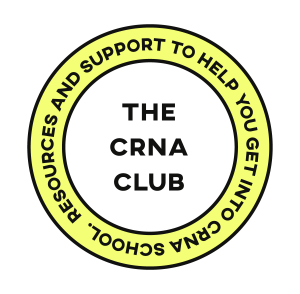When applying to nurse anesthesia school, your GPA is one of the most critical factors admissions committees consider. With the average GPA of accepted students hovering around 3.6, many programs are highly selective. But what if your GPA isn't as competitive? Don’t worry—there are strategic ways to strengthen your application and improve your chances of acceptance.
In this post, we’ll explore the types of GPAs schools assess, how GPA calculations vary, and what you can do if your GPA is lower than the average.
Understanding CRNA School GPA Requirements
Before diving into strategies, it’s important to understand how CRNA programs evaluate GPA. Different schools may consider several types of GPA when reviewing applications.
Common Types of GPA CRNA Schools Evaluate:
- Cumulative GPA: Your overall GPA across all college courses.
- Science GPA: GPA calculated from your science prerequisites (e.g., anatomy, physiology, chemistry).
- Last 60 Credits GPA: GPA from your most recent 60 college credits.
- Prerequisite GPA: GPA calculated specifically from the required courses for CRNA school (which can vary by program).
Not every CRNA program looks at all these GPA categories, so it’s important to research each school’s criteria. Some programs may place more emphasis on science GPA, while others focus on your most recent coursework.
GPA Calculation Methods Vary By Program
Did you know that the way a school calculates your GPA can affect the outcome? Each CRNA program has its own method, and sometimes the differences can work in your favor.
Key Differences in GPA Calculations:
- Grade Forgiveness: Some schools apply grade forgiveness, meaning if you retake a course and get a higher grade, only the new grade is considered. This can significantly raise your GPA.
- Course Inclusions: Not all schools include the same courses in their GPA calculation. For instance, one school may count pharmacology as part of your science GPA, while another considers it a nursing class and omits it from the calculation.
Because GPA calculation policies vary, it’s crucial to dig into each school’s specific requirements to understand how your GPA will be evaluated.
What’s a Competitive GPA for CRNA School?
To increase your chances of getting into CRNA school, it’s important to know what GPA is considered competitive. Here are some general benchmarks:
Competitive GPA Ranges for CRNA Programs:
- Overall GPA: Aim for a GPA in the range of 3.6 to 3.7 or higher. If your GPA is below 3.5, gaining acceptance to highly competitive programs may be more challenging.
- Science GPA: A science GPA of 3.4 to 3.6+ is often considered strong. Since CRNA programs tend to weigh science courses heavily, focus on excelling in prerequisites like anatomy, physiology, and chemistry.
While these are general guidelines, each school weighs GPA differently. Some may have minimum requirements, while others might take a holistic approach, considering your GPA alongside experience, certifications, and other factors.
Strategies for Improving a Low GPA
If your GPA isn’t where it needs to be, there are several strategies you can implement to improve your academic profile and stand out as a competitive applicant.
Tips for Boosting Your GPA:
- Retake Science Classes: Review your science coursework and identify any classes where you earned a B- or lower. Retake these courses and aim for A’s. For example, if you struggled with general chemistry, consider retaking it or taking more advanced courses like organic chemistry or biochemistry.
- Graduate-Level Courses: Enroll in graduate-level nursing courses such as advanced pathophysiology or pharmacology. Performing well in these challenging courses demonstrates that you can handle the rigorous academic demands of a CRNA program.
- Strengthen Your Science GPA: Even if your overall GPA is lower, focusing on improving your science GPA can compensate. Admissions committees often prioritize your science coursework, so getting strong grades in these areas is essential.
- Consider Grade Forgiveness Policies: Some programs may offer grade forgiveness, allowing you to retake a course and replace your lower grade with a higher one. This can be a quick way to boost your overall GPA.
By taking proactive steps to improve your academic performance, you can demonstrate to CRNA programs that you are committed to overcoming academic challenges.
Conclusion: GPA Isn’t Everything—But It Matters
While GPA is a crucial factor in how to get into CRNA school, it’s not the only one. Even if your GPA is below the competitive range, you can still improve your chances through strategic actions like retaking courses, excelling in graduate-level work, and understanding each school’s GPA calculation methods.
Remember, the journey to becoming a CRNA requires determination, perseverance, and thoughtful planning. By focusing on your academic growth and addressing any gaps in your GPA, you can present a stronger application to CRNA programs.
Want more tips on boosting your CRNA application?
Watch our 30-Minute Masterclass on "How to Become a Competitive CRNA School Applicant" or download our free guide for personalized strategies to strengthen your application and stand out from the crowd!


